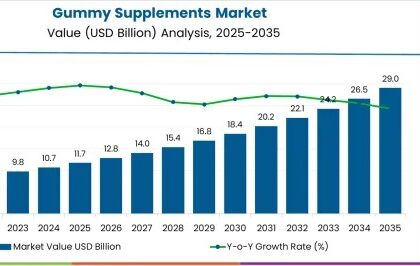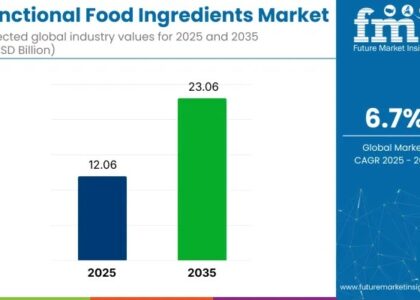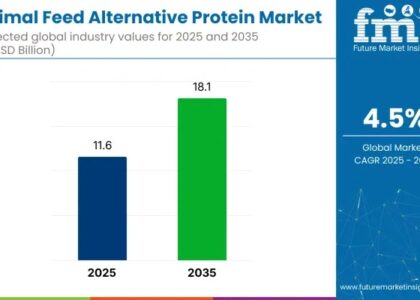
The global pharmaceutical drug delivery market is poised for substantial growth, with a projected compound annual growth rate (CAGR) of 6.4% from 2023 to 2033. According to recent market analysis, the market is expected to generate revenue of USD 1.9 trillion in 2023 and surge to an impressive USD 3.5 trillion by 2033.
The increasing demand for innovative drug delivery systems, driven by advancements in biotechnology, personalized medicine, and the growing prevalence of chronic diseases, is a key factor propelling the market’s expansion. Pharmaceutical drug delivery methods such as oral, injectable, transdermal, and inhalable technologies are gaining traction due to their ability to improve patient compliance, enhance therapeutic efficacy, and reduce side effects.
This impressive growth trajectory is driven by increasing demand for advanced drug delivery systems that improve the efficacy, safety, and convenience of pharmaceuticals. Innovations in drug delivery technologies and the rising prevalence of chronic diseases are contributing to the market’s expansion.
As the pharmaceutical industry continues to evolve with new delivery methods and technologies, the drug delivery market is set to play a crucial role in enhancing patient outcomes and advancing healthcare solutions.
The pharmaceutical drug delivery market trends and forecast indicate that the businesses are investing heavily in research and development to create new compounds for various therapeutic applications and drug delivery platforms. The corporations put a lot of money into R&D to bring high-quality, innovative items to market. Biopharmaceutical businesses’ R&D spending has likewise increased over time.
For pharmaceutical drug delivery carriers, self-administration and home care are likely to provide considerable growth prospects. This is primarily due to the growing geriatric population, as elderly people make up a sizable market for drug delivery devices for home care. This aspect is also driving up demand for application-specific injectable, inhalation, topical, and transdermal medication treatments tailored to caregivers’ and patients’ needs.
Governments in both rich and developing countries advocate cost-cutting pharmaceutical drug delivery mechanisms like lowering prescription reimbursement prices and boosting the use of generics. Government agencies, insurers, and patients are putting pressure on drug makers all across the world to cut costs. The global market study on the pharmaceutical drug delivery market indicates that due to the downward pricing pressure, drug acceptance is increasing in emerging markets, where the need for low-cost treatments is high.
Several pharmaceutical companies, however, are suffering as a result of this. Moreover, this trend is projected to continue in the next years, owing to ongoing demand from insurers, pharmacy benefit managers (PBMs), and public and private payers to lower pharmaceutical drug delivery device pricing to cover more innovative drugs for common ailments like high cholesterol and diabetes.
The pharmaceutical drug delivery market share is projected to reach US$ 2200 Bn by 2026.
Key Takeaways
- The high share of the North American market can be attributed to the rising prevalence of chronic diseases like cancer, respiratory allergies, and diabetes, as well as increasing patient compliance with innovative drug delivery technologies and the presence of a large number of major players in the region.
- Infectious disorders accounted for the greatest portion of the pharmaceutical drug delivery industry in 2020.
- The rising prevalence of infectious diseases around the world, rising R&D expenditure for new treatments as a result of the present COVID-19 pandemic scenario, and the rising number of FDA approvals for such drugs all contribute to the infectious disorder market segment’s substantial share.
- Governments in developing nations are investing heavily in modernizing their healthcare infrastructure, which is projected to enhance access to healthcare services.
“The increased prevalence of chronic diseases, the developing biologics industry, and increasing technological breakthroughs and new product releases are all driving this market forward.”—opines an FMI analyst.
Competitive Landscape
The number of pharmaceutical drug delivery carriers is growing due to increased spending by key market players in research and development and clinical trials of pharmaceutical medication delivery methods.
Due to multiple major, medium, and small players, the worldwide pharmaceutical drug delivery market is extremely competitive and fragmented. These companies have a significant market share in their respective regions. Leading players’ growth strategies are expected to propel the global market as per the upcoming pharmaceutical drug delivery market key trends & opportunities.
- DARZALEX (daratumumab), a subcutaneous formulation that decreases treatment time for multiple myeloma indications, was approved by the FDA in July 2021.
- Pfizer, Inc. gained FDA approval in December 2020 for BRAFTOVI (encorafenib) plus cetuximab to manage patients with brafv600e-mutant metastatic colorectal cancer (CRC) who have previously received treatment.
A Full Report Analysis Click Here
Key Segments
By Route of Administration:
- Oral Drug Delivery
- Injectable Drug Delivery
- Topical Drug Delivery
- Ocular Drug Delivery
- Pulmonary Drug Delivery
- Nasal Drug Delivery
- Transmucosal Drug Delivery
- Implantable Drug Delivery
By Application:
- Infectious Diseases
- Cancer
- Cardiovascular Diseases
- Diabetes
- Respiratory Diseases
- Central Nervous System Disorders
- Autoimmune Diseases
- Other Applications
By Facility of Use:
- Hospitals
- Ambulatory Surgery Centers/Clinics
- Home Care Settings
- Diagnostic Centers
- Other Facilities of Use
By Region:
- North America
- Latin America
- Europe
- Europe
- Asia Pacific
- Middle East and Africa (MEA)
Author
Sabyasachi Ghosh (Associate Vice President at Future Market Insights, Inc.) holds over 12 years of experience in the Healthcare, Medical Devices, and Pharmaceutical industries. His curious and analytical nature helped him shape his career as a researcher.
Identifying key challenges faced by clients and devising robust, hypothesis-based solutions to empower them with strategic decision-making capabilities come naturally to him. His primary expertise lies in Market Entry and Expansion Strategy, Feasibility Studies, Competitive Intelligence, and Strategic Transformation.
Holding a degree in Microbiology, Sabyasachi has authored numerous publications and has been cited in journals, including The Journal of mHealth, ITN Online, and Spinal Surgery News.
About Future Market Insights (FMI)
Future Market Insights, Inc. (ESOMAR certified, recipient of the Stevie Award, and a member of the Greater New York Chamber of Commerce) offers profound insights into the driving factors that are boosting demand in the market. FMI stands as the leading global provider of market intelligence, advisory services, consulting, and events for the Packaging, Food and Beverage, Consumer Technology, Healthcare, Industrial, and Chemicals markets. With a vast team of over 400 analysts worldwide, FMI provides global, regional, and local expertise on diverse domains and industry trends across more than 110 countries.
Contact Us:
Future Market Insights Inc.
Christiana Corporate, 200 Continental Drive,
Suite 401, Newark, Delaware – 19713, USA
T: +1-347-918-3531
For Sales Enquiries: sales@futuremarketinsights.com
Website: https://www.futuremarketinsights.com
LinkedIn| Twitter| Blogs | YouTube





